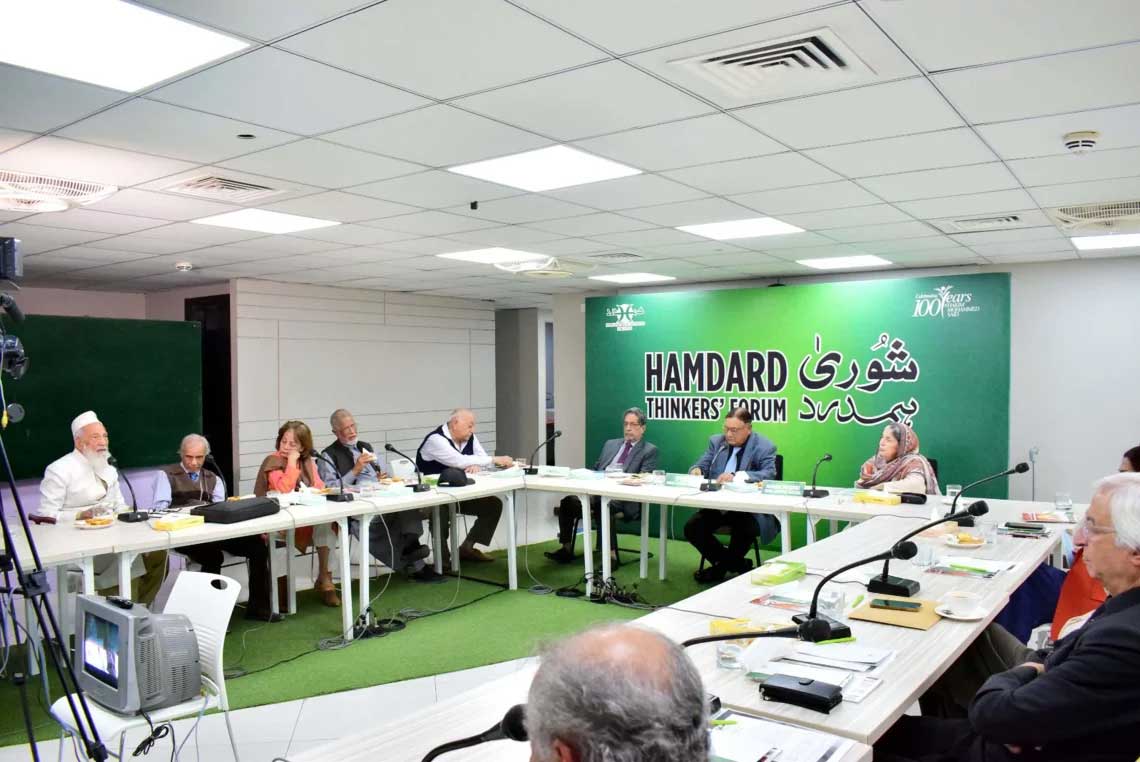KARACHI: Global politics is still influenced by religious, ethnic, and linguistic biases. The international silence on the Gaza atrocities is a recent example of it. The duplicity of the Western countries has dampened two and a half centuries of human consciousness development, human rights, and intellectual progress. The hypocrisy of powerful nations is now evident to all. They have dual standards of humanity when it comes to Israeli terrorism against Palestinians, says a Press release.
Dr. Khalida Ghous expressed these views during the monthly Shura Hamdard meeting titled” “Respect For Global Peace”, held Thursday at Hamdard Corporate Head Office, chaired by Speaker Shura Hamdard General (Retd) Moinuddin Haider. Former diplomat Hassan Habib was invited as the guest speaker. Sadia Rashid, President of Hamdard Foundation Pakistan, also attended the meeting.
Dr. Khalida Ghous further said: “Various factors, such as identity and socio-economic conditions, fuel motivations behind global conflicts. There is a growing influence of right-wing politics worldwide, observed in countries, particularly in India and Israel, where Muslims and Islam are often targeted. These right-wing governments, in an attempt to divert attention from their shortcomings, engage in targeting Islam and Muslims for political gain. Consequently, there is a global increase in Islamophobia and anti-Muslim sentiments. It is imperative for Pakistan to integrate all minorities into the national mainstream and promote a sense of Pakistani identity. Pakistan, established to uplift every marginalized section of the subcontinent, should strive for inclusivity and unity.”
Speaker Moinuddin Haider said that China had posed a challenge to American, and by extension, Western dominance. The rapid advancement of human technology is primarily attributed to the defense sector. Many technologies initially designed for defense purposes have subsequently found application in commercial contexts.
Guest speaker Hassan Habib said that claims of upholding humanity and international human rights are often mere rhetoric employed by powerful nations to serve their own interests. Those who advocate for humanity in the Russia/Ukraine conflict tend to remain silent on Israel’s crimes against humanity, focusing instead on criticizing Hamas and justifying Israel’s barbaric atrocities. Regrettably, the Muslim world faces internal challenges such as corruption, nepotism, and other social issues. The Organization of Islamic Cooperation (OIC) exhibited disappointing behaviour, as the meeting on Israeli aggression in Gaza concluded without reaching a decision.
Dr. Rizwana Ansari said that in today’s world, only economically prosperous and developed countries can effectively pursue a policy of diplomatic freedom. Development is considered a form of security, and nations that do not progress find themselves marginalized in global conflicts and political dynamics. Muslim societies, as a collective, have faced continuous degradation and intellectual stagnation. Despite the youth in Pakistan forming a significant portion of the population, their potential contribution to global development is hindered by the lack of education and training aligned with contemporary needs. Recognizing that competition is inherent to human nature, fostering this instinct becomes crucial in combating social issues. This drive should be harnessed to instill a curiosity to explore cosmic and natural scientific mysteries.
Colonel (Retd) Mukhtar Ahmed Butt said that significant and powerful nations bear direct responsibility for the unsettling state of international peace and order. Their approach is evident: initiate destruction through attacks, followed by making the targeted country a colony by offering contracts and loans. Libya, Iraq and Lebanon, once relatively prosperous, have now fallen into misery. The primary instigator of wars between nations is the arms manufacturing industry. The Western industrial military complex sparks conflict and generates reasons for selling their products, ultimately leading countries to wars. It is also responsible for harnessing the conditions conducive to civil unrest in various parts of the world.
Engr. Anwar-ul-Haq said that the strength of a state is rooted in its political system. A fundamental principle dictates that a state excels and becomes a global leader when it prepares its workforce to pursue national interests and provides justice to its subjects. This involves establishing a robust system and ensuring its execution by devising comprehensive policies aligned with short and long-term national goals. Maintaining a balance of power is essential for countries to safeguard themselves against conflicts, especially foreign aggression against powerful countries. Despite a border dispute, countries like America and Canada have set the issue aside, entrusting its resolution to future generations, and built their mutual relations based on trust and mutual trade. The global disparities in wealth distribution also stand out as one of the few significant causes of tensions between nations.
Senator Abdul Haseeb Khan, Usman Damohi, Prof. Dr. Hakim Abdul Hanna, Dr. Amjad Jafri and others also spoke on the occasion.
Global politics still influenced by religious, ethnic & linguistic biases, Shura Hamdard is told




